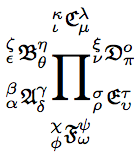| MathML3 - Maths for the Web |
| Monday, 01 November 2010 | |||
|
MathML 3 gives us the prospect of being able to put mathematical equations into web pages without converting them to bitmaps. If you think that this isn't an important topic ask yourself how can we move to electronic text books without supporting equations?
If you have ever been confronted with the problem of how to include equations in a web page then perhaps you have taken the coward's way out and converted the equation to a bitmap. This is the only way you can ensure that almost any browser will render the equation correctly. However in the brave new world of HTML5 we will have MathML3 which should allow you to embed editable equations in text form. MathML has been around for a while but so far it hasn't become the standard that we all use. This is mainly due to lack of support from IE - it needed a plug-in to render MathML. There has also been some resistance in the academic community who have long been devoted to Donald Knuth's LateX as a way of rendering equations. The big change is that MathML is included in HTML5 and is already in Firefox, Chrome and IE 9. So while we can't quite relax and assume that it is ok to include a single MathML equation in a web page without having to send the user off to download an add-in the future looks good for MathML.
The latest version doesn't make any changes to the basic idea that MathML is an XML markup language with a separation into semantic and presentational components. The latest version adds support for languages that flow from the right to the left. Could this be the end for LateX? Probably not but a single strong standard that is widely available across browsers, ebooks and other document editing and presentation systems has huge attractions. And finally - yes I have to admit that I Programmer will still be using bitmaps for equations until IE 6 becomes an insignificant proportion of our traffic. Sad isn't it. For more information on MathML including browser support and applications such as editors the best place to start is http://www.w3.org/Math/. If you would like to check if your browser can render MathML correctly browse to https://eyeasme.com/Joe/MathML/HTML5_MathML_browser_test.html. (Which is where the illustration above comes from.)
|
|||
| Last Updated ( Monday, 01 November 2010 ) |

